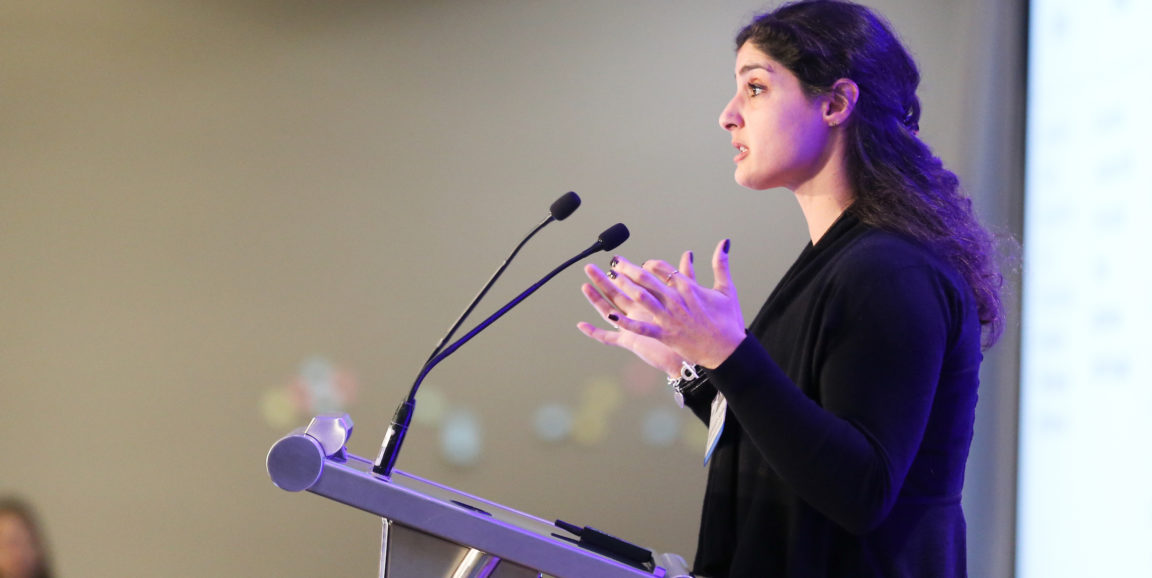International Women's Day offered a reminder to "celebrate women's achievement, raise awareness against bias and take action for equality." Stanford-trained surgeon Arghavan Salles, MD, PhD, is up for the challenge.
As a scholar in residence with Stanford Medicine's educational programs, Salles researches gender equity, implicit bias, inclusion and physician well-being. Beyond Stanford, she is an activist against sexual harassment in medicine, and she's written on these topics from a personal perspective for the popular press, including Scientific American and TIME magazine.
I recently spoke with her to learn more.
What inspired your research focus?
As an engineering undergraduate, I never really thought about gender or diversity issues.
Then during the first year of my PhD at Stanford, I learned about stereotype threat. The basic idea is that facing a negative stereotype about part of your identity can affect your performance during tests. For example, randomized controlled studies show that if minority students are asked for their race or ethnicity at the beginning of a test of intellectual ability, like the GRE (Graduate Record Examination), this question can impair their performance. A lot of decisions are based on these kinds of test scores, and this really changed how I think about merit.
At the time, I was also in the middle of my residency to become a surgeon. I started thinking about whether stereotype threat affects women who are training to be surgeons, so that's what I studied for my dissertation.
I have continued to think about these types of issues, studying things like: Who gets the opportunity to speak at conferences? Does gender affect how supervisors write performance evaluations for residents and medical students? And how extensive is gender bias in health care?
How does gender bias impact women surgeons?
We all have biases. Growing up in the U.S., we generally expect men to be decisive and in control, and women to be warm and nurturing. So, when women physicians make decisions quickly and take charge in order to provide the best care to their patients, they're going against expectations.
I hear the same struggles from women all over. For women surgeons in particular, for example, the operating room staff often don't hear when they ask for instruments. The staff may not have all the devices and equipment in the room because their requests aren't taken as seriously as those of men. And they are often labeled as being demanding or difficult if they act like their male colleagues, which has significant consequences on opportunities like promotions.
Related to gender bias, women surgeons also deal all the time with microaggressions from patients and health care professionals. For instance, patients report to the nursing staff they haven't seen a surgeon yet, when their female surgeon saw them that morning. Or they say, 'Oh, a woman surgeon. I've never heard of that.' So you have to strategically decide what to confront.
How can we address these issues?
It's really important to have allies to give emotional support and advice, but also to speak up when these things are happening. For example, an ally can speak up if a committee member brings up something irrelevant during a promotion review.
In the bigger scheme, we need to change how we hire people, to make it more difficult to act on our biases. We should use a blinded review so we don't know the gender or race of the applicant. We should have applicants do relevant work sample tests to select the most qualified candidate. And we should use standardized interview questions. Changing how we hire and promote people would make a big difference.
We also need to create a culture of inclusion, in addition to hiring more women, underrepresented minorities and transgender and nonbinary gender people to bring new ideas. Diversity without inclusion is essentially exclusion. We've talked about gender today, but a lot of the same challenges are faced by other underrepresented groups.
Why do you write about these topics from a very personal viewpoint?
In some ways, I'm a naive person. I don't have the same degree of professional self-preservation that some people have. There may be unintended negative consequences, but I'm just honest to a fault.
The piece about anger came out of seeing time and time again women being misunderstood -- having their anger attributed to some personality flaw rather than a reasonable consequence of what they were experiencing. I figured if I wrote about it, I could raise awareness and maybe a few people would react differently the next time they saw a woman express anger.
I wrote the fertility piece because I wanted to share my experience to educate people, so fewer people would end up involuntarily childless. In general, I just feel that it's important to share my experiences to help others not make the same mistakes that I have.
Photo courtesy of Arghavan Salles




